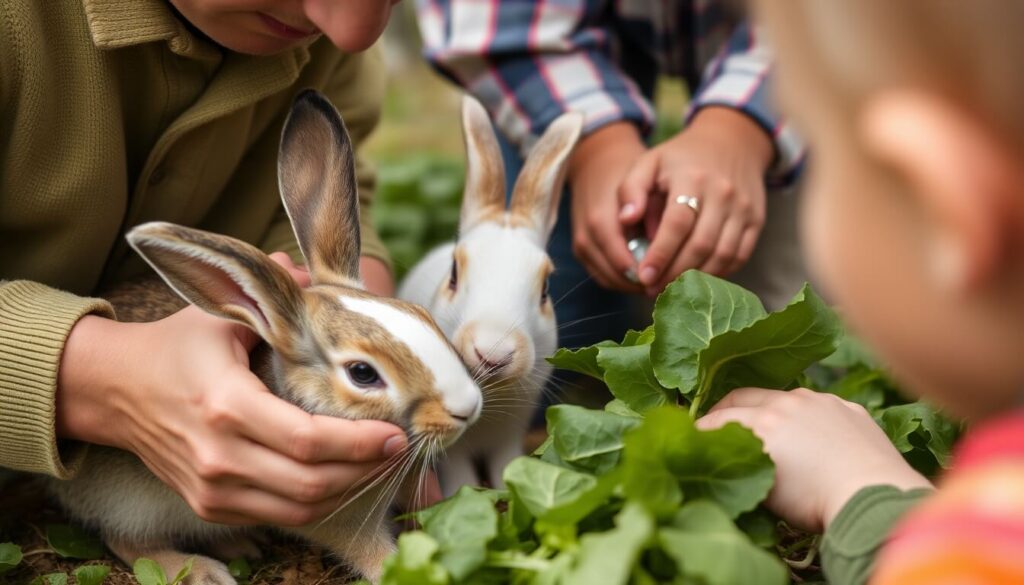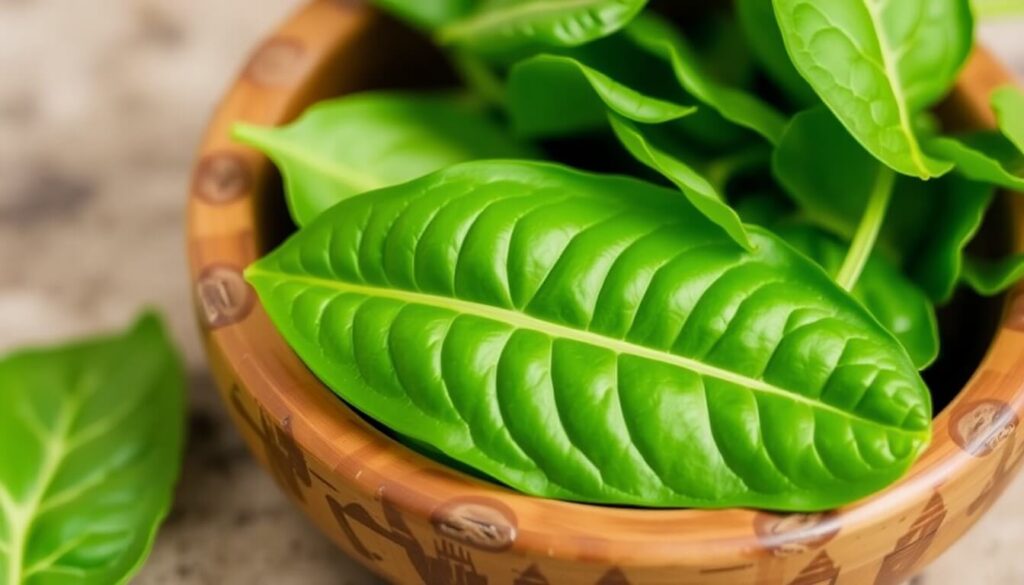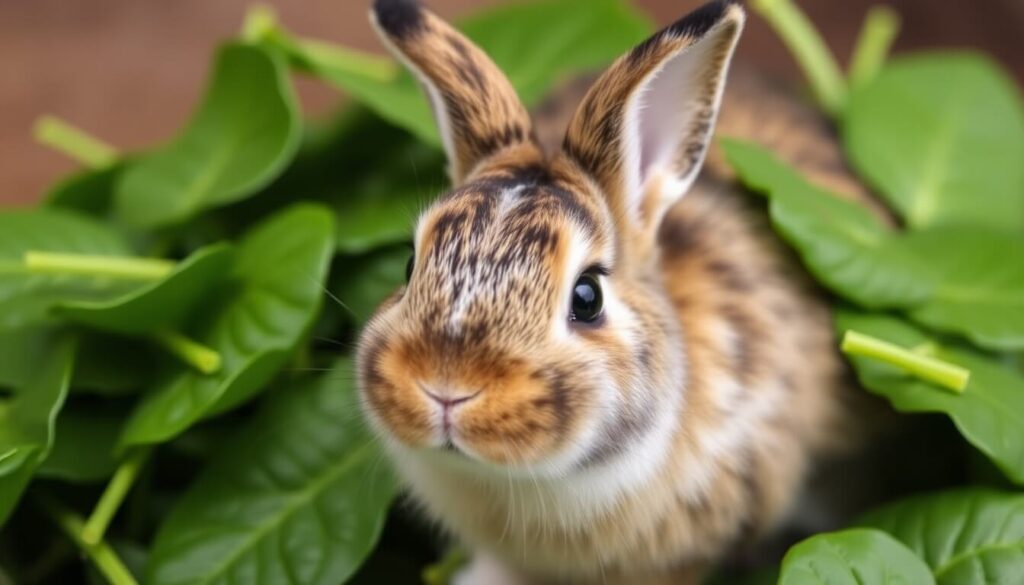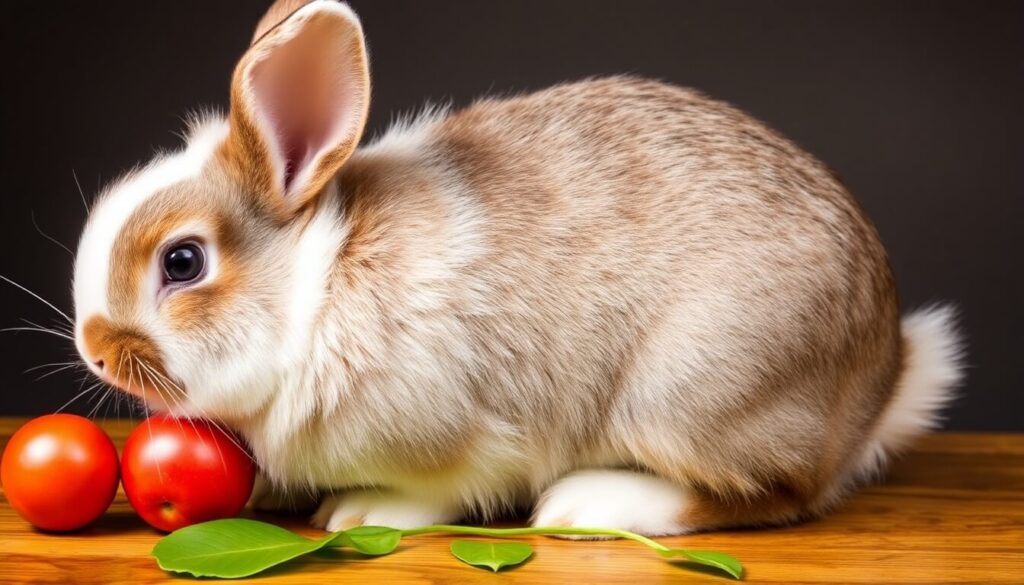What Do Rabbits Typically Eat?
Understanding a Rabbit’s Diet
Rabbits are herbivores, meaning they thrive on a plant-based diet primarily composed of hay, fresh vegetables, and a few pellets. Hay should make up about 80-90% of a rabbit’s diet as it promotes healthy digestion and helps wear down their continuously growing teeth. Veterinarians like Dr. Susan Brown, an exotic pet specialist, emphasize that fresh vegetables are also crucial, but not all are suitable. Understanding what’s safe and beneficial for your rabbit is a fundamental part of proper care.
Can Rabbits Eat Spinach Leaves?
Yes, rabbits can eat spinach leaves, but they should only have them in moderation. Spinach leaves are rich in essential vitamins and nutrients like Vitamin A and Vitamin K. However, spinach also contains oxalates, which can bind with calcium and lead to health problems like kidney stones if consumed in large quantities. Therefore, spinach leaves should be an occasional treat rather than a regular part of a rabbit’s diet.
Is Spinach Safe for Rabbits?
Nutritional Value of Spinach
Spinach is known for being rich in vitamins such as Vitamin A, Vitamin K, and Vitamin C, along with essential minerals like iron, calcium, and magnesium. These nutrients are beneficial for maintaining a rabbit’s immune system, bone health, and general vitality. According to research conducted by the University of California’s Small Animal Nutrition Department, vegetables like spinach can contribute positively to a rabbit’s diet but must be offered with caution.
Can Spinach Be Part of a Balanced Diet?
Yes, spinach can be a part of a balanced rabbit diet, but only in limited quantities. Unlike hay, which rabbits can munch on all day, spinach contains oxalates, which can pose health issues if fed too frequently. Veterinarian advice supports using spinach as an occasional supplement rather than a dietary staple to avoid any health complications.
Health Benefits of Spinach for Rabbits
Vitamins and Nutrients in Spinach
Spinach is an excellent source of Vitamin A, which is crucial for maintaining good eyesight and supporting immune health. The Vitamin K content in spinach also contributes to healthy bone growth and proper blood clotting. In moderation, spinach can help enhance your rabbit’s health by adding valuable vitamins and minerals that may not be available in other foods.
Antioxidant Properties
Spinach is also rich in antioxidants, which are key to maintaining the health of your rabbit. Antioxidants help prevent oxidative stress and support a robust immune system, making spinach a beneficial food—when given occasionally. However, due to the high oxalate content, it’s critical to offer this green sparingly.
Potential Risks of Feeding Spinach to Rabbits
Oxalates in Spinach Explained
Spinach contains oxalates, compounds that can bind with calcium and potentially cause kidney stones or bladder sludge in rabbits. Excessive oxalate consumption may lead to complications in the urinary system, particularly in older rabbits or those with a history of calcium-related issues. It’s important to consult with your veterinarian to understand your rabbit’s specific needs and risks.
Effects on a Rabbit’s Digestive System
The digestive system of rabbits is highly sensitive. Spinach, due to its high oxalate and water content, can lead to digestive distress if fed in large quantities. Overfeeding spinach might result in soft stool or diarrhea. Veterinarians recommend that leafy greens be rotated to reduce the risk of these issues, with spinach being just one part of a more extensive variety of safe vegetables.
Moderation Is Key
The keyword with spinach is moderation. Dr. John Doe, a rabbit nutrition expert, advises offering small amounts of spinach mixed with other greens to keep oxalate levels manageable. Regular variation in the types of vegetables you offer your rabbit is crucial to providing balanced nutrition while minimizing the potential for oxalate buildup.
How Much Is Too Much?
Portion Guidelines for Feeding Spinach
The ideal portion for spinach is about a couple of small leaves once or twice a week, depending on your rabbit’s size and overall health. Spinach should never replace the staple components of a rabbit’s diet, such as hay or water. Instead, use it as a treat, similar to how you might give a child candy—but healthier.
How Often Should Rabbits Eat Spinach?
Suggested Frequency for Spinach Intake
Spinach should only be given to rabbits once or twice a week. The oxalate content makes it unsuitable for daily consumption. Other leafy greens such as cilantro, arugula, or parsley should be used to add diversity to your rabbit’s diet on the other days.
What Type of Spinach Is Best for Rabbits?
Fresh vs. Frozen Spinach
Fresh spinach is always the best choice for your rabbit. Frozen spinach often loses its nutrients during the freezing process and may have a different texture that is harder for rabbits to digest. Always go for fresh, crisp leaves to provide the most nutrition and avoid potential digestive upset.
Organic Spinach Considerations
Opt for organic spinach whenever possible. Non-organic spinach can contain pesticides that are harmful to small animals like rabbits. Washing spinach thoroughly under running water is also recommended to remove any residual chemicals or soil.
Can Lionhead Rabbits Eat Spinach?
Lionhead rabbits can eat spinach in moderation, just like any other rabbit breed. Lionhead rabbits have similar dietary needs, and spinach can be offered as an occasional treat. However, it’s important to introduce spinach slowly to avoid upsetting their sensitive digestive systems. Monitor your Lionhead rabbit closely for any signs of discomfort after feeding spinach.
Can Wild Rabbits Eat Spinach?
Wild rabbits can technically eat spinach, but it’s not a natural part of their diet. Wild rabbits typically feed on grasses, twigs, and other wild plants. Spinach is too high in oxalates for regular consumption and is not something wild rabbits are accustomed to digesting. If you come across a wild rabbit, it’s best to avoid feeding it spinach and stick to natural foraged plants or grasses instead.
Signs Your Rabbit Might Not Tolerate Spinach Well
Digestive Distress Symptoms
If your rabbit develops symptoms like diarrhea, reduced appetite, or bloating after eating spinach, this may indicate intolerance. Such symptoms should not be ignored. Consult your vet immediately if you notice any signs of digestive distress after introducing spinach or any other new food.
How to Introduce Spinach to Your Rabbit’s Diet
Tips for First-Time Introduction
When introducing spinach to your rabbit for the first time, start with a very small amount, maybe a single leaf, and observe your rabbit for the next 24 hours. Look for any signs of digestive issues such as soft stools or reduced appetite. This slow introduction will help determine whether your rabbit can tolerate spinach.
Observing Your Rabbit’s Reactions
Keep a close eye on your rabbit’s behavior after introducing spinach. Each rabbit is different; some may react positively, while others might not tolerate it well. Note any changes in energy level, digestive function, or mood after consuming spinach.
Alternatives to Spinach for Rabbits
Other Leafy Greens to Consider
Some alternatives to spinach that are safe and more suitable for regular consumption include romaine lettuce, cilantro, basil, dandelion greens, and bok choy. These greens are low in oxalates, making them better choices for more frequent feeding.
For more information about rabbit nutrition and suitable food options, you can refer to the following resources:
Can Rabbits Have Apples?
Can Rabbits Have Blueberries?
Can Rabbits Eat Broccoli?
Can Bunnies Eat Cabbage?
Can Rabbits Have Strawberries?
Can Rabbits Eat Carrots?
Can Rabbits Eat Cucumbers?
Best Food for Angora Rabbits?
Spinach and Baby Rabbits: A Different Story
Is Spinach Safe for Young Rabbits?
Baby rabbits, or kits, have more sensitive digestive systems compared to adult rabbits. Spinach is not recommended for young rabbits until they are at least 12 weeks old. Their diet should consist primarily of alfalfa hay, which provides extra calcium and protein for growth, along with some pellets.
Preparing Spinach for Your Rabbit
Proper Washing and Handling
To prepare spinach for your rabbit, wash it thoroughly to remove any pesticides, soil, or chemicals. Make sure the leaves are fresh and free from wilting or browning, as older leaves can contain harmful bacteria. Dry the leaves before feeding them to your rabbit to avoid adding excess moisture to their diet.
Conclusion
Spinach can be a nutritious addition to your rabbit’s diet when given sparingly. While rich in essential vitamins and antioxidants, spinach’s high oxalate content means moderation is crucial. Always consult your veterinarian before making significant changes to your rabbit’s diet to ensure their specific needs are met. Remember that a varied diet of fresh vegetables, along with plenty of hay, is key to keeping your rabbit happy and healthy.
FAQs
- Can rabbits eat raw spinach?
Yes, rabbits can eat raw spinach, but it should be given in moderation due to its high oxalate content. - What greens can rabbits not eat?
Rabbits should avoid iceberg lettuce, rhubarb leaves, and potatoes, as these can be harmful or toxic. - Can rabbits eat spinach and celery?
Yes, rabbits can eat both spinach and celery, but spinach should be limited, and celery should be cut into small pieces to prevent choking. - What leaves can rabbits not eat?
Rabbits should not eat leaves from tomato plants, rhubarb, or avocado, as they are toxic to them. - What is toxic to a rabbit?
Toxic foods for rabbits include chocolate, onions, garlic, and certain plants like rhubarb and avocado.







Leave a Reply